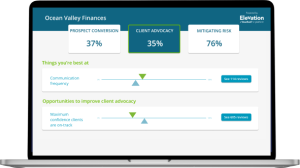The Consumer Duty clock is ticking, as firms have until the end of July 2023 to be compliant. At VouchedFor, we’ve hosted a packed schedule of webinars to help firms navigate the Consumer Duty.
Based on the questions you’ve asked, here are answers to the 15 most commonly asked questions, to help you nail your response.
Put simply, the FCA believes that not enough firms are putting their consumers’ needs first.
The Consumer Duty is designed to ensure that consumers receive
- communications they can understand;
- products and services that meet their needs and offer fair value; and
- the support they need, when they need it.
The Consumer Duty sets out that firms should put consumers at the heart of their business.
The duty is made up of:
A Consumer Principle:
‘act to deliver good outcomes for retail customers’.
Three ‘cross-cutting rules’, which firms should apply to everything they do:
- Act in good faith
- Avoid causing foreseeable harm
- Enable and support retail customers to pursue their financial objectives
Four outcomes which firms are expected to monitor and evidence:
- Products and services
- Price and value
- Consumer understanding
- Consumer support
There are also other important requirements relating to governance, vulnerability and monitoring.
The new rules are very significant, and they complement, rather than replace, existing regulation.
Many of the specific outcomes and rules are consistent with previous regulations (including PROD and TCF rules).
However, the Duty also contains overarching requirements around monitoring, vulnerability, culture, governance and accountability.
Advice firms will need to work harder to evidence outcomes, using the resulting data to drive all levels of organisational decisions.
This makes the new Duty a very meaty piece of regulation.
The first key milestone is that firms need to produce an implementation plan by 31st October 2022.
They then need to be compliant with the rules by the end of July 2023 for all new and existing services (they have another year for closed books or legacy products to be compliant).
Some key things to think about within your response.
- Create a taskforce to review and oversee the changes that will be required (processes, governance, documentation and culture). Interestingly, unlike regulation that has gone before, many firms choose a person not in Compliance to lead this.
- Identify business areas likely to be affected. For instance…your MI and data sources, SM&CR arrangements, value assessments, product governance, customer service, marketing and communications.
- Evaluate each area against the four Consumer Duty outcomes to identify priorities. This will expose gaps and highlight where you need more visibility.
- Create a plan, mapping out what you propose to do, by when. How will you deliver, monitor and evidence each of the four outcomes? The ability to evidence outcomes is essential. Firms should ask themselves, ‘Are we collecting the right data? What data do we need to measure outcomes?’
- Implementation. What processes will ensure you review your plan and your performance against the Duty, and take action to address opportunities for improvement? How can you embed the Duty in your firms’ culture?
We’ve analysed the feedback of over 250,000 clients through our Elevation platform and, broadly, most clients are happy with their current experience. But there is opportunity to improve in areas like client understanding and evidencing value, which the Duty will help with.
The FCA has set out that the new Duty “will set higher and clearer standards of consumer protection across financial services and require firms to put their customers’ needs first”.
A notable shift in this most recent regulation is that the Consumer Duty, compared with what’s come before, is the move from what firms communicate to whether clients understand it. For example, the FCA has previously required firms to be transparent about their fees, but it is now important to check that clients have understood those fees.
For example, Elevation asks clients how their advisers’ fees work; currently only 83% can give an answer.
It is likely that the biggest change for clients will be greater transparency of costs, improved clarity of communications, and better understanding of risk.
The Duty does contain special considerations for vulnerable clients.
For instance, it requires advice firms to tailor communications to characteristics of vulnerability. And to benchmark the experience of different client groups to ensure that clients in vulnerable circumstances achieve as good outcomes as other clients.
Elevation data shows that this is an important step forward for the industry.
First, because very few firms regularly benchmark outcomes between clients in vulnerable situations and others.
Secondly because clients in vulnerable circumstances give worse client experience scores than other clients.
For example, 4.2% of clients with low financial knowledge barely read correspondence from their adviser. This is four times higher than clients whose level of financial knowledge is average or high.
Most firms are in good shape and are delivering good outcomes for their clients.
Typically larger firms are further into their preparations but then have further to go, vs smaller firms.
Also, more financial planning focussed firms are closer to the requirements than purely investment focused firms.
Elevation data shows that most firms have work to do in areas like consumer understanding, evidencing value and embedding the right governance structure.
The commercial case is exciting.
There’s plenty of evidence that firms who embrace the Consumer Duty as more than a box-ticking exercise see significant improvements in business performance. They convert more prospects and receive more client recommendations.
For example, 63% of prospective clients who leave a 5-star first-impression review on our platform intend to become a client. This more than halves to 28% if they leave a 4-star rating.
Much of what keeps advisers on the right side of that line sits at the heart of the Consumer Duty.
For instance:
- Discussing a customer’s needs and objectives is a key requirement of the Consumer Duty (especially within the Products & Services outcome).Prospects who say that the motivations behind their goals were discussed ‘in depth’ convert into clients at a rate of 59%.This drops to 43% where motivations were discussed, but not ‘in depth’. And to below 14% when goals or motivations were not discussed at all.
- 27% of clients who say they ‘couldn’t be more confident’ they understand risk make an average 1.9 recommendations per year.That’s much more than the 1.1 recommendations from clients who say they have only ‘enough’ understanding of risk. And recommendations fall off a cliff for clients who don’t understand risk.
Our data shows that most clients are achieving good outcomes, but there are identifiable gaps.
Here are some of the top opportunities across the industry:
- The Consumer Duty requires advice firms to enable consumers to understand cost.One in six clients (17%) do not understand how they pay for financial advice.The picture is worse for prospective clients. Only one in three prospective clients (29%) understand how an adviser’s fees work after an initial meeting.
- The Consumer Duty requires firms to ensure fair value, and that the price that consumers pay is reasonable compared to the benefits.Yet our data reveals that 18% of clients are either not sure they are on track to achieve the goals they are working towards with their adviser or are only quite confident.
- The Consumer Duty requires firms to give consumers the information they need, at the right time, and presented in a way they can understand.Yet 59% of clients say that the correspondence they receive from their adviser and their firm could be clearer. Of particular concern, 1% of clients don’t receive any correspondence at all (or at least that is their perception).
- Lastly, the duty requires firms to test, monitor and evidence good outcomes throughout their customer journey.Collecting the right data here is key. Yet in a recent adviser survey, our Elevation team found that only 24% of advice firms regularly ask their clients for feedback and only 7% ask for feedback from all prospective clients.
It’s important to note that the Duty is not suggesting that ‘cheapest is best’. Instead, it requires firms to justify why they charge what they do.
Some of the data points that we collect to help firms show the value they offer clients are:
- their average fees and how they compare with the industry
- the proportion of their clients who feel confident they are on track to achieve their goals
- the proportion of of their clients who feel they have full access to their adviser
- their ‘value for money’ rating out of 5
- the proportion of their clients who understand their fees, as it’s hard for them to assess value if they don’t
As an example, we work with a national advice firm which charges more than the industry average, but can demonstrate higher-than-benchmark scores for each of the above measures.
The Consumer Duty doesn’t express a view on what you charge, as long as you can justify it.
Potentially though, discounting fees could become a problem if two near-identical clients were paying significantly different fees for the same service.
At this stage, it’s too early to tell. However, we do know the following:
- The FCA knows it has to supervise and enforce this well or the Duty will fail. Almost all respondents to their consultation called this out.
- The FCA says it is not introducing any new regulatory reporting requirements at this stage. But has not ruled it out.
- The FCA says it will use insights and data to focus its policing efforts. And there is a greater availability of data than has ever been true in the past.
- The FCA says it will make periodic requests of firms for instance in asking to see Consumer Duty implementation plans and Board reports.
We think that the FCA is taking a ‘wait and see’ approach to policing this regulation. Rather than saying ‘cross X line and it will result in Y fine’ the FCA appears keen to see how firms respond to the Duty and then adapt their policing framework accordingly.
In a word: data.
Page 67 of the final guidance outlines some of the various data sources that the FCA recommends firms collect, including customer complaints, surveys, net promoter scores, focus groups and customer research.
Among these, unsurprisingly, we believe collecting the right consumer feedback is a must. You can’t be sure that someone understands something without asking them.
When we changed the question to ‘how do your adviser’s fees work?’ and only 83% of clients could give the right answer – a truer reflection of clients’ understanding.
For non-advised/execution only services, the FCA has stated that firms providing such services can assume that the customer’s financial objectives are purely the enjoyment and use of the product and service they have purchased (and any wider interests).
However, where the firm has a broader relationship with the client – one which gives them information that may indicate whether the product/service aligns with the clients’ financial objectives – they need to take that into consideration.
For example, if a client was considering a high-risk product, or one with a long maturity rate, and the firm understood from its advisory relationship that the client planned to retire soon, then the firm might seek to highlight to that client the relevant risks associated with such a product.
Client feedback is one of the key data points the FCA recommends that advice firms collect. And client feedback is our area of expertise.
Advice firms can use our new Elevation platform (think of it like a much more powerful client survey) to manage their ongoing response to the Consumer Duty in a few ways:
- Elevation collects feedback at key stages of the customer journey, helping you monitor and evidence outcomes.
- Elevation helps you identify risks. For instance, clients who don’t feel they are getting value or don’t understand your fees, enabling you to reach out and give them the support they need.
- Elevation’s intuitive dashboards share key client experience data at firm and adviser level, which helps with the governance requirements of the Consumer Duty.
- Elevation produces a real-time Consumer Duty Report that shows you (and the regulator) how you are doing against the four Consumer Duty outcomes. It also shows how you compare with the industry.
- Data from Elevation and the Consumer Duty Report can be shared with the board as part of the board report required by the Consumer Duty.
Further to this, Elevation helps you tap into the huge commercial opportunity that comes with embracing the Consumer Duty properly. Specifically, it shows you the most impactful things that you and your advisers can do to increase prospect conversion, generate more recommendations and reduce risk.
Elevation, from VouchedFor, uses client feedback to drive business growth. Powered by 250,000 clients’ feedback, it identifies which factors make the biggest positive difference to client experience, and uses carefully engineered questions within a client survey to reveal how advice firms are tracking against them.
Elevation helps you drive advocacy from existing clients, improve conversion of prospective clients, and mitigate risk by identifying issues early. It can also form part of your ongoing response to the Consumer Duty.
To find out how Elevation can help you, or if you’re interested in getting content to help you meet your Consumer Duty, contact elevation@vouchedfor.co.uk




